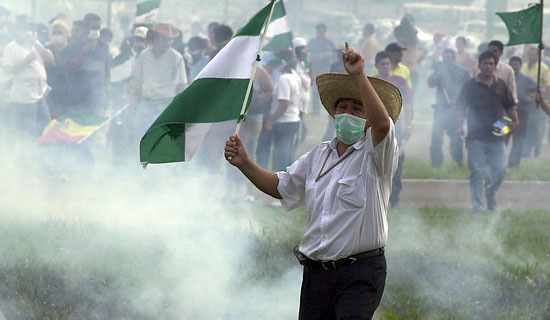
(above) Demonstrators demanding the end of a military intervention face a cloud of tear gas at the entrance of the Viru Viru international airport in Santa Cruz de la Sierra, Bolivia. (photo: Amanecer Tedesqui/The Associated Press)
Residents vie with troops for control of Bolivia's busiest airport
October 18, 2007, International Herald Tribune - AP
SANTA CRUZ, Bolivia–Armed with clubs and waving provincial flags, thousands residents of Bolivia's wealthiest province seized the country's busiest airport Friday, wresting local control back from troops sent in by President Evo Morales.
The seizure of the airport was a victory for leaders of a province fighting for greater autonomy from the socialist central government, which appeared to accept that it would not try to reclaim the facility.
Soldiers and military police melted away before the protesters flooded into Santa Cruz's Viru Viru airport terminal, avoiding clashes. It was not immediately clear if they had left the airport entirely or withdrawn to a distant part of the property.
Morales ordered 220 troops to take the airport after local airport workers threatened to block flights that did not pay landing fees to local rather than national officials.
It quickly became a flashpoint between Bolivia's national government and a region seeking greater autonomy.
At least two soldiers were injured Thursday, one by gunfire, and local hospitals reported that about 20 other people were injured, some by tear gas troops fired to repel protesters shouting "The airport belongs to Santa Cruz!"
Santa Cruz Gov. Ruben Costas called for citizens to retake the airport Friday and thousands responded, marching past a few startled passengers into the terminal waving clubs and green-and-white Santa Cruz flags.
The soldiers left "with their tails between their legs," Costas said.
Planes continued to land and takeoff during the day, though passengers who had boarded one flight had to disembark because the air traffic controllers brought in with the troops had left and the returning old controllers were not yet back.
The flight left later and the head of the local airport authority said operations were back to normal.
Morales' top aide, Juan Ramon Quintana, called the takeback "a defeat for the people of Santa Cruz and the people of Bolivia," but the government appeared to acknowledge it would not challenge local rule, saying it hoped local officials would root out corruption it alleged had marred operations at the airport.
Morales said he sent in troops because airport workers demanded air crews pay up to US$2,000 (€1,400) in cash as an alternative to landing fees paid to the national airport authority.
"Preserving the good image of the airports is an obligation," Morales said. "Viru Viru was doing poorly, making illegal charges."
Among the carriers affected was American Airlines, which canceled two flights through Santa Cruz on Wednesday and one Thursday as well as flying a plane out empty of passengers on Tuesday. The airline, a unit of Dallas-based AMR Corp., said it was back to its normal two flights through San Cruz on Friday.
The airport conflict has broad political implications because Santa Cruz, the nation's largest and wealthiest province, has resisted Morales' efforts to nationalize industries and redistribute land and wealth to Bolivia's poor majority.
Santa Cruz leaders want autonomy from La Paz and a bigger share of their state's natural gas revenues, but Morales needs the cash for other, desperately poor parts of the country.
Among those stranded for awhile by the crisis was Norman F. Mydske, the Latin American director of the Billy Graham Evangelical Association, from New Charlotte, North Carolina, who had been trying to catch a connection to Cochabamba, Bolivia's central city, since Tuesday.
"I pray everything goes well," he said